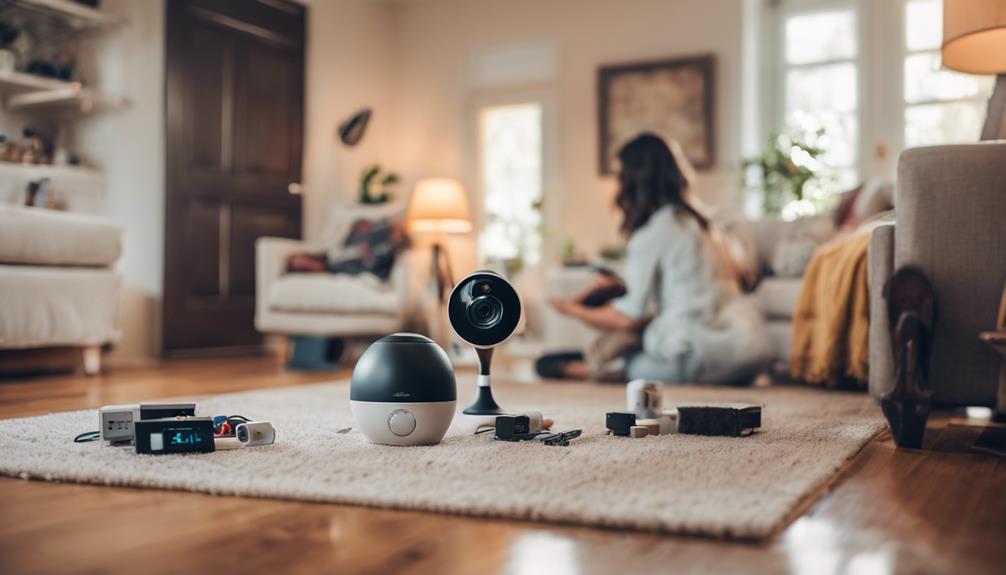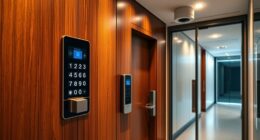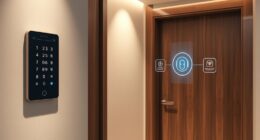Wired home security systems connect their components to a central control panel using physical cables like coaxial wires. These cables link sensors, cameras, and alarms, creating a dependable network for your safety. During installation, professionals run cables through walls and ceilings, ensuring everything is neatly concealed and strategically placed to maximize security. Backup batteries are included, so your system continues to function even during power outages. While installation costs can be higher, the reliability and superior video quality often make it a worthwhile investment. Stick around to uncover more details about the benefits and considerations of wired systems.
Key Takeaways
- Wired home security systems connect components using coaxial cables, providing reliable signals between sensors, cameras, and the central control panel.
- Installation involves running cables through walls and ceilings to link various devices, requiring professional expertise for optimal placement and minimal disruption.
- The central control panel receives signals from door/window contacts, motion detectors, and cameras, coordinating the entire security system's functionality.
- Backup batteries are integrated into wired systems to maintain operation during power outages, ensuring continuous surveillance and alarm functionality.
Understanding Wired Home Security Systems
When contemplating a home security solution, understanding wired home security systems is vital, as they connect various components directly to a central control panel through physical wiring. Understanding how to install wired security systems is essential for homeowners looking to implement a reliable and secure option for their property. These systems typically require professional installation for the wiring and proper connections to the central control panel, ensuring that all components are functioning correctly. Knowing how to install wired security systems can also help homeowners make informed decisions about maintenance and troubleshooting in the future.
These systems typically use coaxial cables to guarantee reliable connections between sensors, cameras, and alarms. This direct connection reduces the risk of interference or signal loss, offering you a more stable security experience.
Wired home security systems often require professional installation due to the complexity of running wires throughout your home. While this may seem like an added hassle, it guarantees that everything is set up correctly and efficiently.
You'll also want to take into account the equipment costs, which generally range from $300 to $2,000, with installation fees sitting between $100 and $500. This initial investment provides extensive security coverage, protecting your home more effectively.
Many systems come with backup batteries, allowing the system to function even during power outages. This feature is vital for maintaining security at all times.
Components of Wired Systems

When you look at wired home security systems, the key components play an essential role in their effectiveness.
You'll typically find a central control panel, various sensors, and cameras that work together to keep your home safe.
Understanding the installation process also helps you appreciate how these elements fit into your overall security strategy.
Key System Components
A reliable wired home security system is built around essential components like the control panel, sensors, cameras, and a central hub, all interconnected to guarantee seamless communication and power supply.
The control panel acts as the brain, receiving signals from various sensors placed at entry points and high-traffic areas. When a breach is detected, it triggers alarms and alerts, ensuring you're always informed.
Sensors in your system include door/window contacts, motion detectors, and glass break detectors. These sensors utilize wired connections to provide consistent communication with the control panel, minimizing the chances of signal interference.
Your security cameras connect directly to a Digital Video Recorder (DVR) or Network Video Recorder (NVR) through coaxial cables, ensuring high-quality video surveillance that's reliable and clear.
Additionally, backup systems like battery backups are vital for maintaining functionality during power outages. This means your security system remains operational at all times, protecting your home regardless of external circumstances.
Installation Process Overview
Installing a wired home security system involves strategically running cables to connect the central control panel, sensors, and cameras, guaranteeing a stable and reliable network throughout your home. This installation typically requires professional expertise, as maneuvering the complexities of running a network of physical cables through walls and ceilings can be time-consuming.
Key components, such as sensors placed at entry points and cameras transmitting video data, are vital for effective security. The control panel consolidates all information and controls the system, making proper device placement essential.
Additionally, backup batteries are often included to maintain functionality during power outages, making sure your system remains operational even when the electrical supply is interrupted.
To achieve peak performance, careful planning of wiring routes is critical. Poor installation can lead to vulnerabilities or inefficiencies in security coverage.
Installation Process of Wired Systems

Properly routing cables through walls and ceilings requires professional assistance to guarantee an effective and reliable wired home security system. The installation process involves running cables, typically coaxial or Ethernet, from security cameras and sensors to a central control panel. This guarantees reliable communication and power supply over long distances.
To achieve a successful setup, consider the following:
- Ideal placement of sensors and cameras to cover entry points and high-traffic areas
- Drilling holes and concealing wires for a clean, aesthetic look
During installation, modifications to your home may be necessary, and these tasks can get messy. Professional assistance guarantees that everything is done with precision, minimizing disruption to your daily life.
Careful planning is essential, as it directly impacts the effectiveness of your wired systems. By entrusting experts with the installation process, you can focus on what matters most—your home's security. With the right setup, you'll enjoy peace of mind knowing that your system is both reliable and efficient.
Advantages of Wired Security Systems

When you consider wired security systems, you'll appreciate their reliability and stability compared to wireless options.
They not only offer enhanced security features that are harder for intruders to disable, but they also prove to be more cost-effective in the long run.
Let's explore these advantages further to see why a wired system might be the right choice for your home.
Reliability and Stability
Wired security systems deliver unmatched reliability and stability, guaranteeing your property remains protected without the interruptions often seen in wireless setups. Thanks to the direct connection provided by physical cables, you can expect consistent performance, eliminating issues like signal interference that can leave your property vulnerable.
Consider these advantages of wired security systems:
- Continuous operation: Without reliance on batteries, you won't face the risk of failures due to dead batteries, providing uninterrupted monitoring.
- Higher-quality video: Wired systems support superior audio and video signals, making them perfect for thorough surveillance across larger areas.
The stability of wired security systems translates to robust security coverage that wireless systems simply can't match. While installation may be complex, once set up, you can trust that your system will deliver reliable performance, safeguarding your property around the clock.
In an age where security is paramount, choosing a wired system guarantees you're making a sound investment in your safety and peace of mind.
Enhanced Security Features
How can you affirm your security system is as robust as possible? By opting for wired security systems, you guarantee enhanced security through reliable connections that stand strong against interference.
With physical wires in place, it's much harder for intruders to disable the system, reducing the risk of tampering considerably. This added layer of protection means you can sleep easier at night, knowing your home is safeguarded.
Wired systems also typically come equipped with backup batteries, maintaining functionality during power outages and guaranteeing your security remains intact.
Additionally, these systems support higher video resolutions, such as up to 4K, which enhances your surveillance capabilities and provides clearer images when it matters most.
You'll also appreciate that wired setups often lead to minimal false alarms, allowing you to focus on real threats rather than dealing with unnecessary notifications.
With fewer components than wireless alternatives, you'll find that long-term maintenance costs are lower, as you won't have to worry about frequent battery replacements or upgrades.
To summarize, choosing a wired security system means investing in a more secure and reliable solution for your home.
Cost-Effectiveness Over Time
Investing in a wired security system can save you money over time, thanks to lower maintenance costs and potential insurance discounts. While the installation costs may range from $100 to $500, the long-term savings often outweigh this initial expense.
You'll enjoy several benefits:
- Lower maintenance expenses due to fewer components
- No ongoing monitoring fees, which many wireless systems require
Wired security systems are known for their reliability and durability, which means they're less susceptible to electrical interference and system malfunctions.
This consistency not only enhances your peace of mind but also reduces the likelihood of costly false alarms.
Additionally, the financial protection provided by these systems can help prevent property losses from theft or damage, making them a wise investment in your home's security.
Disadvantages of Wired Security Systems

One major drawback of wired security systems is their high upfront installation costs, which can range from $100 to $500, often deterring DIY enthusiasts.
You'll typically need professional installation, as the process involves running wiring throughout your home, which can be complicated and disruptive. This complexity can also make it impractical for renters, who may not have permission to alter the property.
Once installed, wired systems lack the flexibility that many homeowners desire. If you want to relocate or modify the system, it can be a cumbersome process.
Additionally, wired systems are vulnerable to power outages. Without a backup battery, if the primary power source is cut, your entire system may become inoperable, leaving you unprotected.
Furthermore, knowledgeable criminals can exploit these systems by cutting phone lines or power sources, rendering your security measures ineffective during a breach. This vulnerability can be a significant concern for those relying solely on wired security systems.
Comparing Wired and Wireless Systems

When deciding between wired and wireless home security systems, you'll want to weigh the pros and cons of each to find the best fit for your needs. A wired home security system offers a stable and reliable communication link through physical connections, making it less susceptible to signal interference. This means you'll enjoy a more secure setup, especially for larger homes requiring extensive coverage.
Consider these points:
- Professional installation: Wired systems often need expert installation, which can increase your upfront costs.
- Long-term maintenance costs: Wired systems usually have lower long-term maintenance costs compared to wireless systems, which may require frequent battery replacements.
Ultimately, if you're prioritizing security and reliability, a wired system could be your best choice. However, if you value flexibility and ease of setup, wireless systems may be more suitable for your lifestyle. Assess your home's layout and your personal needs before making a decision.
Frequently Asked Questions
How Is a Home Alarm System Wired?
When you wire a home alarm system, you connect sensors and cameras to a central control panel using low-voltage cables. Professional installation helps guarantee everything's securely placed and functions reliably, providing consistent security for your home.
Are Home Security Systems Hardwired?
Yes, home security systems can be hardwired. They connect sensors and cameras directly to a control panel using physical wires. This setup offers reliable communication, particularly in areas with poor Wi-Fi coverage.
Is It Better to Have a Wired or Wireless Security System?
When choosing between wired and wireless security systems, consider your home's layout and budget. Wired systems offer reliability, while wireless options provide flexibility. Assess your needs to determine which system fits your lifestyle best.
Are Wired Security Systems Obsolete?
In today's world, you can't judge a book by its cover. Wired security systems aren't obsolete; they adapt to modern needs, offering reliability and longevity that many homeowners still trust for thorough protection against threats.
Conclusion
In the world of home security, choosing a wired system can feel like opting for a classic novel over a fleeting trend.
With their reliable connections and robust performance, wired systems offer a sense of stability that echoes the time-tested tales of safety and security.
While they come with their own set of challenges, the peace of mind they provide often outweighs the drawbacks.
So, if you value dependability, a wired system might just be your best plot twist.









